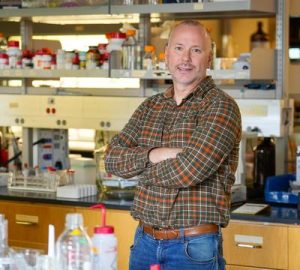Origins of life scientist Greg Springsteen receives Governor’s Award
June 13, 2024Furman University’s Greg Springsteen, professor of chemistry, received the 2024 South Carolina Governor’s Award for Excellence in Scientific Research at a Predominantly Undergraduate Institution in a June 11 ceremony at the Statehouse in Columbia, South Carolina. Governor Henry McMaster presented the award.
Springsteen has worked with about 50 undergraduates over his 18 years at Furman to explore what he describes as one of the most fundamental chemical conundrums: how life emerged from a mixture of organic molecules in a lifeless environment. His work is based on the idea that a few core components of modern metabolism (the chemical reactions of life) existed on primordial Earth before they were incorporated and adapted in living systems.
“As this early metabolism evolved into a more robust chemical system, these central biosynthetic pathways remained frozen at the core of an expanding network to become modern life,” he explained. “In my lab, we search for those frozen-in-time remnants.”
Springsteen’s research has spawned new lines of inquiry, presentations, awards and a raft of publications in higher-tier journals including Nature Communications, Nature Chemistry, and Angewandte Chemie, the latter two featuring Furman undergraduates as lead authors.
Springsteen said research at Furman, a national liberal arts and science university, is less subject to the strict research cycles, higher costs and publishing pressures often seen at larger R1 universities. This allows him and his students the time to ask big questions that require years, if not decades, to solve, while still receiving competitive funding from the NASA Exobiology program, the National Science Foundation’s Centers for Chemical Innovation and Major Research Instrumentation programs, the Henry Dreyfus Teacher-Scholar Award and others.
In an all-undergraduate environment at Furman, novel ideas develop organically over time, and new questions emerge, Springsteen said. His work led to a method for synthesizing citric acid cycle intermediates, which can be used diagnostically, for example, to identify cancer cells.
Recognizing the commercial applications for the technology, Springsteen and former student Trent Stubbs ’20 created Aconabolics, LLC on campus in 2018, where the biological intermediates are produced, then distributed globally.
In 2020, the startup received South Carolina Research Authority’s first-ever academic assistance grant, and in 2022, a U.S. patent was awarded to Stubbs and Springsteen for their intellectual property.
The on-campus venture bolsters Furman’s presence in the Upstate’s entrepreneurial ecosystem and serves as a platform for teaching students about the nuances of starting a business – skills Stubbs and Springsteen honed with guidance from Furman’s Hill Institute for Innovation and Entrepreneurship and other Upstate partners.
“Since opening my lab in 2006, I’ve focused on training undergraduates to excel in academic, societal and commercial pursuits, and our successes are indicative of the pride and effort these students have committed to their work,” Springsteen wrote in his case statement for the Governor’s Award.
Springsteen said he’s grateful to the nominating committee including Jeremy Cass, dean of faculty; Tim Hanks, the Charles Ezra Daniel Professor and Chair of Chemistry; Beth Pontari, vice president for Academic Affairs and provost; and John Wheeler, associate provost for Integrative Science and professor of chemistry.
The award is co-sponsored by the Governor’s Office and the South Carolina Academy of Sciences (SCAS). Springsteen joins six other Governor’s Award honorees from Furman: Gil Einstein, emeritus professor of psychology (2013); Wheeler (2015), Hanks (2017) and Paul Wagenknecht, professor of chemistry (2020).
In 2018, John Kaup, director of science education, was recognized with the Award for Excellence in Scientific Awareness, and in 1989, Lon Knight, professor emeritus of chemistry, received the Award for Excellence in Scientific Research across all South Carolina higher education institutions before the undergraduate category was established.














